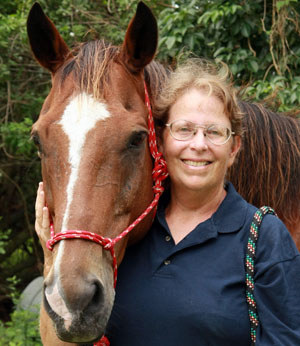TALES FROM THE TRAILS
Coyotes have been in the news lately. Neighborhoods throughout Palm Beach County have had multiple sightings. People are on the alert. Traps have been set. Garbage cans have been raided. Most disturbing of all, dogs and cats have been snatched.
Marsha Abate knows only too well about coyotes on the hunt. She and her husband, Bob, own a small boarding and breeding operation in The Acreage called the Galloping Parrot. They bought the land 20 years ago and built the house and barns five years later.
The decor is half horse, half parrot, because they also take in rescue birds. In addition to four horses, they share their home with four macaws, a cockatoo with a death wish, 24 geese, 21 white ducks, 21 peacocks and assorted smaller parrots.
“Horses are my life,” Marsha said. “I started riding at 5, and by 13 I learned how to trim hooves and started my own farrier service. Doing other people’s horses’ feet paid all my show fees.”
The birds started more recently, with parakeets, a sun conure and a quaker parrot.
“I just loved them, especially the quaker,” Marsha recalled. “He was my best friend. He’d sleep in the trees with the peacocks at night, then stay on my shoulder all day long. One day a hawk got him. I was devastated. So, one Christmas, my husband bought me a baby blue and gold macaw as a present. Topaz was like my child; it was as if I’d given birth to him. Unfortunately, he became ill and died at nine months. He’d had a birth defect. I was distraught.”
Eventually, more birds came along, and so was born the Galloping Parrot and the new digs. Which, a few years ago, led to a new problem.
“When we first moved out here, everything was fine,” Marsha said. “Then, about seven or eight years back, we started seeing iguanas running through the pasture. We have a big pond, and canals on two sides of the property. The iguanas swam around or sunned in the grass, maybe five or six of them.”
But that was before they started multiplying.
“We had a big freeze a few years back, and most of them died, but then they started breeding again, and soon there were lots of iguanas, some of them pretty big, 3 or 4 feet long, even a couple of 5-footers,” Marsha said. “We would see more than a dozen at a time. They ate the mulberries off our bushes. The real problem started when they made burrows in the horse pasture. Bob fell in the holes three different times. That was pretty scary. A horse could easily break a leg if he hit one of those holes at speed. So every day we filled in the holes, and every night they dug them again.”
Enter the coyotes. They’re not new in the area. Marsha has been aware of them for the past three years. They ate many of her ducks, geese and peacocks.
“They really did a job on the flocks,” she said. “They’d carry off a full-grown goose.”
They tried setting traps without success. They set up a motion-activated game-cam, and every night, here came the coyotes. It’s hard to tell how many, but there are at least two, side by side, one larger, one smaller. They usually come by between 1 and 4 a.m., but occasionally, she has caught sight of them walking through the pasture in broad daylight. The tracks also tell the tale, showing where they enter and leave the property.
Oddly enough, the coyotes have taken care of the original problem: they’re eating the iguanas! Marsha has found the spots where the coyotes have dug down into the burrows, and she is seeing a whole lot fewer iguanas.
“I’m not worried they’d go after one of the horses,” Marsha said. “They’re not that stupid. And all the parrots are indoors. But knowing they come every night is worrisome. They can carry rabies, and they kill the ducks, geese and peacocks. My birds live in fear for their lives.”
When they’re hungry, coyotes go after any small animal — cats, dogs, rabbits, turtles.
“There’s no way to keep coyotes out. They can jump a 10-foot fence like it’s not there. They’re smart. And, unfortunately, there’s gonna be a lot more of them,” Marsha said. “I’m glad they ate the iguanas. I wish they’d just eat the rest of the iguanas and leave everything else alone.”
Coyotes are not generally a threat to human safety and are normally timid toward people. If a coyote approaches, immediately use a noisemaker or shout and wave your arms. A solid walking stick or golf club is a powerful deterrent at close range. Throwing stones, a strong spray from a water hose, or pepper spray can work, as can an air horn or a “coyote shaker” — pebbles or pennies in an empty soda can. Donkeys also offer good protection against coyotes. They hate them and will run them off.
Coyotes are present in all 67 Florida counties. Their numbers have stabilized in north and central Florida, but they are increasing here in South Florida. Like it or not, coyotes are probably here to stay.








